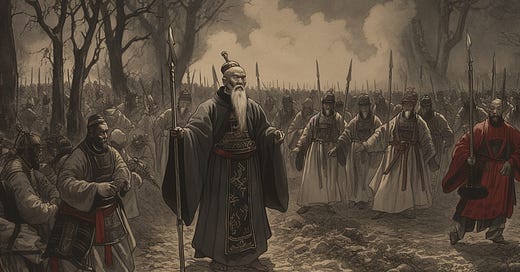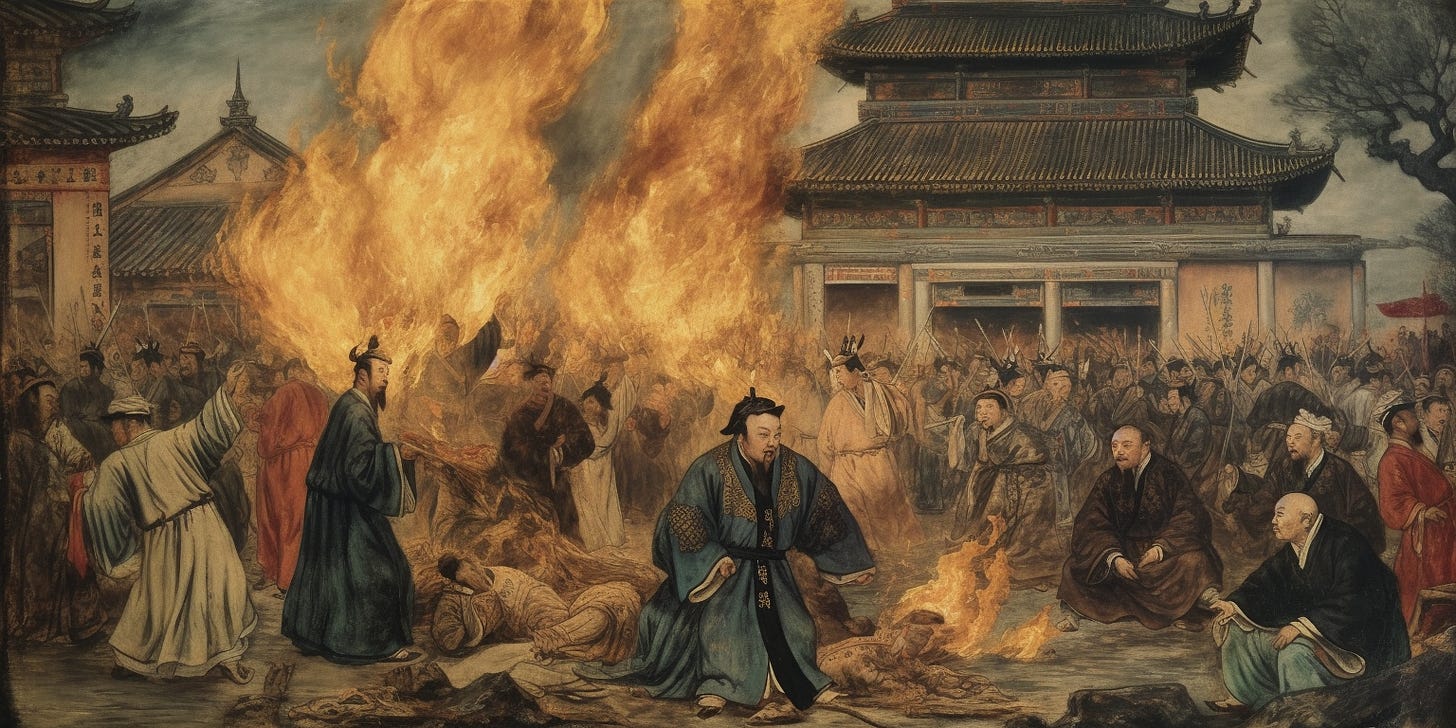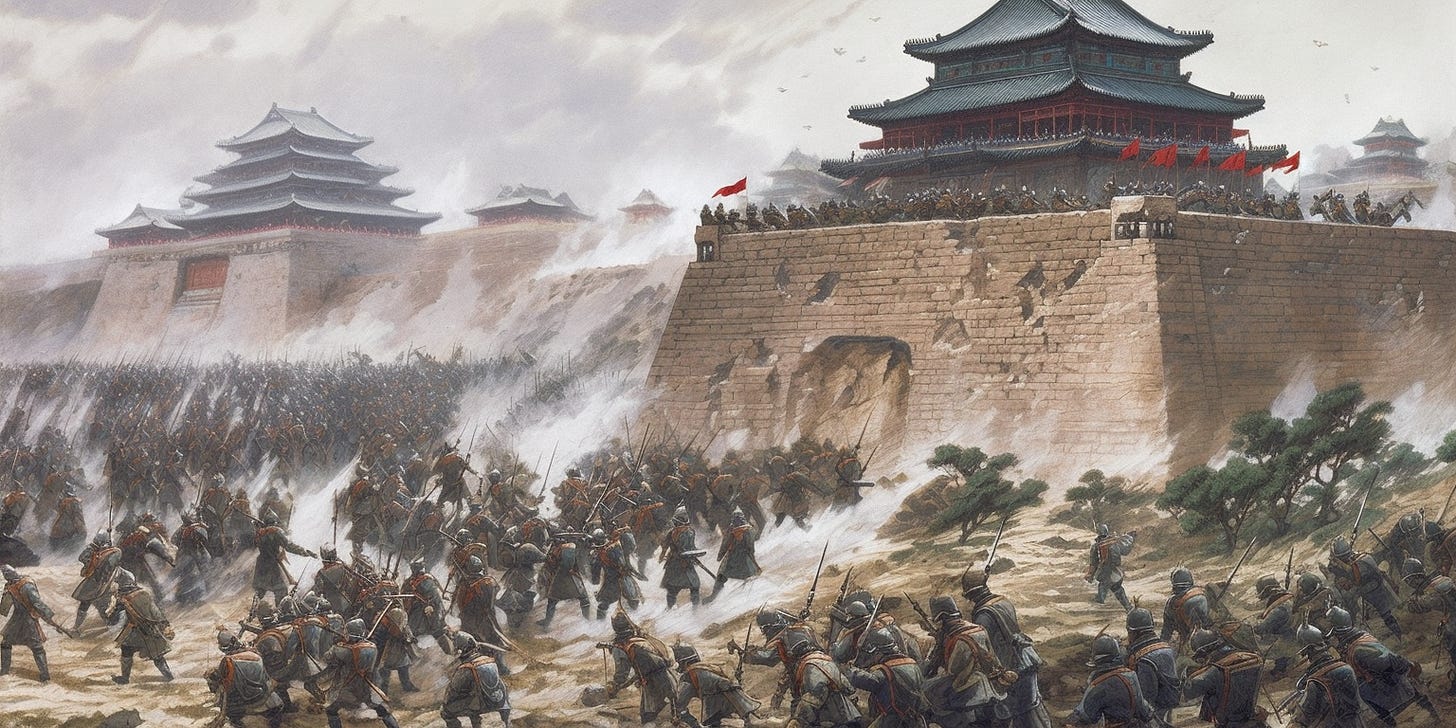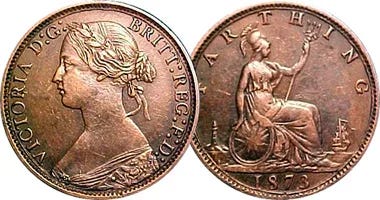Find other China Wars articles here. Find more discussion at the RTE Locals community.
Leaving aside the totality of World War II, or similar summaries, the largest human death toll noted in human history occurred in China during the mid-nineteenth century. It's known as the Taiping Rebellion, and an estimated 20 to 40 million Chinese died in the battles and gruesome aftermath. Downstream death tolls may have been even higher as groups such as the Miao ethnic minority were practically devastated. Western history books give scant attention to the event, but it may be crucially important to understanding the geopolitics of today—even in the West.
What Was the Taiping Rebellion About?
Where to begin…
Two centuries into the rule by the tiny Manchu minority over China (Qing Dynasty), the First Opium War (1839-1842) took place between England (or perhaps more accurately the British East India Company and its backing bankers with borrowed naval power) and China. The British victory resulted in the Treaty of Nanking (naming it after the Capitol was likely an intentional display of linguistic dominance) that passed a great deal of wealth to the British, gave Hong Kong to Queen Victoria (perhaps an official royal landlord for a corporate juggernaut?), and perhaps most importantly began an era of protected Christian missions to the Far East.
It should surprise no one that religion is often used as a tool for statecraft. And we may never know the exact relationship between the immediate push of Christian missionaries into China and the rise of Hong Xuiquan. What we do know is that in 1836, the academically precocious Xuiquan came into contact with an American Congregationalist chaplain by the name of Edwin Stevens. Stevens was a Yale graduate funded to bring Christianity and printed Bibles to China.
While Xuiquan had passed preliminary civil service exams with high marks, his parents were too poor to fund his education in the later material. He struggled and failed the imperial examinations that would have elevated him to a permanent status of substance in the Chinese government. Then he had a nervous breakdown.
While convalescing from his delirium, Xuiquan suddenly realized that he was the brother of Jesus (cosmically, though he still kept familial relations with his fleshy birth parents), sent by God to fight demon worshippers who infested the Confucianist Qing Empire.
While such a revelation sounds like it should come from a maniacal raving lunatic, Xuiquan's friends reported that he shed something like a crippling neurotic persona for a calm, even-tempered demeanor. Some even thought his height and physical stature increased. One way or another, Xuiquan began cultivating a more impressive image. For work, Xuiquan became a school teacher until at the age of 29, he failed the imperial exams for the fourth time.
What happened next is that Xuiquan began a series of controlled offenses against Qing Confucianism (and sometimes Buddhism, too). He and his growing band of followers burned books and statues. This played on the sympathies of some Han Chinese who vastly outnumbered the ruling Manchurian regime who granted him and his cousin Feng Yunshan two demon-slaying swords (which are probably described in great detail in some out-of-print Dungeons & Dragons manual).
Xuiquan began traveling and preaching with his impressive sword in tow. While gaining followers, Xuiquan eventually returned home to once again work as a school teacher. Feng remained on the road, and will resurface in this story…
In 1847, the then 33-year-old self-proclaimed brother of Jesus received an invitation by somebody at the Chinese Union to study with Issachar Jacox Roberts, an American Southern Baptist. Xuiquan then decided that he was a protestant (because any good brother of Jesus doesn't need a Pope to tell him what's right), but made the mistake of asking Roberts for funds. Roberts refused to Baptize the fervent Xuiquan. Xuiquan continued on his way, making a trip to Thistle Mountain where he found that his cousin Feng had gathered a strong following that fancied itself a new society, ready to reform China.
Feng's Society of God-Worshippers included men who stepped forward in leadership due to their "abilities" to enter trances and speak as the direct voice of the Holy Trinity. The men set out in a series of local recruitment efforts directly patterned after Baptist tent revivals as Xuiquan observed during his time with Roberts. The men spread "The Taiping Bible" and the message that Christianity represented the true religion as it was in China prior to the imperial system. His followers were told that if they successfully raged against the machine (crusaded), they would be rewarded Old Testament-style with music, food, and women for marriage.
The Baptist version is more tame on the surface, but the punchline is tens of millions dead.
Dead in whose name?
Xuiquan and his followers played a masterful political game that might make you wonder what advice they might have had. Their largely local provocations were met with arrests and just enough martyrdom to muster an energetic following that by 1850 numbered perhaps 25,000. When a sizable brute squad was sent to disband the group, the imperial troops were defeated and the local magistrate killed. Weeks later, in early 1851, a more sizable Manchu army launched a full scale attack on Xuiquan and his followers. The attack failed and the Manchu commander was beheaded. The Taiping Rebellion had begun.
It was unusual enough that a local academic managed to raise a small army to shock the regional Qing forces. The reader may speculate on the strategic training of the group's leadership. But the Taiping Rebellion was not only about Xuiquan and his followers. There were always factions in China waiting for the moment to seize power (or at least more power) during every dynasty. The First Opium War left the Manchu in need of greater assistance in running the Empire, and Han Chinese filled a number of gaps in government machinery. Still, there were other factions.
The Nian ("bandit") rebels were akin to what American media currently labels "alt right incels", and simply opposed the Manchu rulers. With civil war upon China, they rolled from the northwest into Qing territory, killing and looting as they went.
Other participants in the Taiping Rebellion had aims that we might call "more suspicious" given their relations to the economic activity of the British East India Company. The Red Turbans were pirates involved in the opium and sex trade…so naturally they were easily connected to the quasi-Southern Baptist Xuiquan army? The Tiandihui ("Heaven and Earth Society") were a secretive sect or cult that formed a few decades earlier, and acted as a Christian-branded mafia out of British-controlled Hong Kong. The Small Sword Society was a similar organization operating out of Shanghai, founded right at the outset of the Taiping Rebellion. They were made up of merchants and gentry who grew wealthy at the point-of-trade with the British and the French, and hid behind those European forces tactically when threatened with more serious combat than they could dominate.
There were other factions involved in the assault on the Qing regime, including various Muslim factions. But ultimately, the massive and widespread conflict in which tens of millions of Chinese died, began prior to, and continued throughout the Second Opium War.
Huh.
Huh.
The thirteen-year rebellion ignited by Xuiquan was punctuated by the four-year second fight between the Western trade empire that took jade, silk, spice, and tea in return for boat loads of opium and most likely chaos agents in Christian robes. This Second Opium War (1856-1860) included the British again, but also included France, the United States, and other Western forces. It was sparked when Qing authorities boarded a vessel flying the British flag while looking for a pirate whose activities were part of the civil unrest engulfing China.
If the Qing imperialists had learned to manage the superior navy of the West, it was certainly constrained by a massive civil war coming at it from all sides. The Taiping Rebels managed to take many important cities, including the Capitol Nanking. Once again, the Great Qing was easily defeated by the Western-corporatist navies.
In 1860, the Qing regime made another expensive peace to end the Second Opium War. Almost immediately, the tide turned in the Taiping Rebellion. Suddenly, the Qing quickly shifted toward the adoption of methods of their Western opponents, and the British helped the Qing draw the line at Shanghai. Humiliation turned to humility, and the Qing were able to retake Nanking, and eventually crush the rebel factions, including that of Xiuquan.
Ultimately, Xiuquan succumbed during a siege at Tianjing during the last days of the Taiping Rebellion. With food running low, Xiuquan is said to have followed a Biblical message in which he interpreted the manna provided to Israelites by God to be the various available flora he could gather. Upon eating the assumed herbal manna, Xiuquan became sick and died.
The Qing army pushed forward into the regions from which the neo-Christian crusaders had sprung, massacring entire villages in a way that would have made Augusto Pinochet blush. There were to be no followers of the rebellious quasi-Christian sect left that could rise from the ashes to threaten the Qing dynasty from within.
But the Manchu rulers were already undone, even if it would take a few more decades for the Last Emperor to give up the throne. The Chinese could be pushed around by the European and American navies at the profitable ports of trade. Many young men who might be conscripted were kept weak by opium addiction. And perhaps the British, with the help of allied Americans, had successfully engaged in a historically unique and religiously-branded mind control campaign—a larger scale version of divide-and-conquer campaigns that the East India Companies had employed successfully against the less powerful adversaries of Asia and all over the world.








The contemporary counterpart to opium: weed. Just enough "recreational" to placate men that would have otherwise be a raging army. Ah, yes, and Netflix. A brain mush, diluted cognitive skills, highjacked consciousness, and information toxicity. Not sure which is worse. I see potential in starting a series of articles about the war on consciousness.
Thanks - enjoyed the history lesson with its obvious parallels to our time.